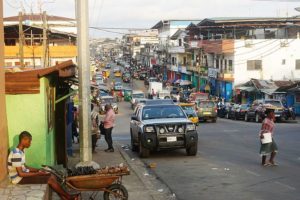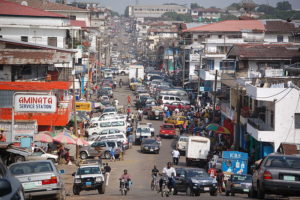Fuel shortages in Liberia due to inconsistencies in bookkeeping and delays in dredging
Liberian citizens are experiencing firsthand the devastating consequences of cascading failures resulting from mismanaged interconnected man-made systems. On February 13th, 2020, the United States Department of State Bureau of Consular Affairs issued a security alert, warning travelers of possible congestion and delays due to a scarcity of commercially-available gasoline in Liberia. This West African nation with a population of 4.8 million has been facing a fuel shortage since late January, and is seeing its already-vulnerable economy in an accelerated decline. The state-owned Liberia Petroleum Refining Company (LPRC), which has exclusive control over the country’s petroleum industry, is being accused of underestimating the amount of its supplies by millions of gallons. Additionally, the port in the capital city of Monrovia has not been dredged since 2017, so the accumulation of silt and detritus has resulted in very shallow waters, rendering large fuel tankers (any vessel longer than 33 feet) unable to dock. Because of this crisis, gas stations are rationing their reserves, drivers are waiting in queues for multiple days, taxis and buses are increasing fares, and trucks are unable to deliver shipments to local businesses.

Small business owners and blue collar workers are among the hardest hit. Liberian journalists have been gathering firsthand anecdotes from would-be fuel consumers as they wait in line at petrol stations. One man shared that he had slept in his car, and believed that his children would miss school because the crowds had not subsided. Yet another explained that his water and milk business had collapsed due to his inability to acquire gasoline to power his generator. Those who are able to purchase fuel are being forced to cut back on other household expenses, as the prices have climbed so high that families are facing budgeting constraints. In response to public outrage, the government has promised to initiate dredging, and suggested that it plans to upgrade the port, allowing space for multiple tankers to unload simultaneously. In the more immediate future, the best option seems to be trucking and shipping gasoline in from neighboring countries like Sierra Leone. Mistrust in the Liberian government is high, as is skepticism towards the possibility that the internal State-organized Special Taskforce investigating the LPRC will illuminate the true causes of this shortage.
To avoid similar crises and consequences like this in the future, Liberian officials have been advised by the Civil Society Network of Liberia’s Executive Director to “put into place the necessary mechanisms to prevent the problem from recurring.” Resilience best practices indicate that there is considerable room for improvement on current practices. First and foremost, coordination and collaboration within sectors is necessary to ensure that conflicting information is not released en masse. Throughout the fuel shortage, the LPRC and the Ministry of Commerce and Industry were not in alignment on their messaging, resulting in confusion and anger from Liberian citizens.

Secondly, the official Task Force monitoring the crisis should be diversified to include non-governmental representatives, increasing transparency and magnifying the opportunity for appropriate checks and balances. The Global Resilience Institute’s Resilience Governance for Infrastructure Dependencies and Interdependencies report recommends that a neutral convener should be responsible for moderating and mediating conversations about critical, sensitive issues. Finally, and perhaps most importantly, those responsible should internalize the critiques from Rev. Kortu K. Brown, President of the Inter-Religious Council of Liberia (IRCL), who succinctly summed up the domino effect experienced across the nation: “It’s obvious that the unavailability of petroleum on the market is affecting other commodities. It will affect the cost of transportation; and the cost of transportation will also affect the cost of other commodities on the market. This is a serious issue; this issue has the propensity of affecting our socioeconomic life in a way that it could further exacerbate the economic hardship for ordinary Liberians who are already struggling and trying to live up to the challenge of economic hardship.” Developing resilient supply chain infrastructure in the nation of Liberia will mitigate the potential for similar disasters in the future, and protect vulnerable populations from additional risks.
Works Referenced:
Port chaos leaves Liberian fuel pumps dry
Liberia: 20 Tankers Reportedly on Way to Sierra Leone for Gasoline to Help Curb Crisis
Civil Society Network of Liberia Speaks On Gasoline Shortage
Liberia: Inter-Religious Council Says Gasoline Shortage Escalates Hardship
Liberia Finance Chief Says Cleanup Will End Economic Woes
Liberia: Government Sets Up Committee to Investigate Gasoline Shortage
Liberia running low on gasoline after reserves go missing
Resilience Governance for Infrastructure Dependencies and Interdependencies
